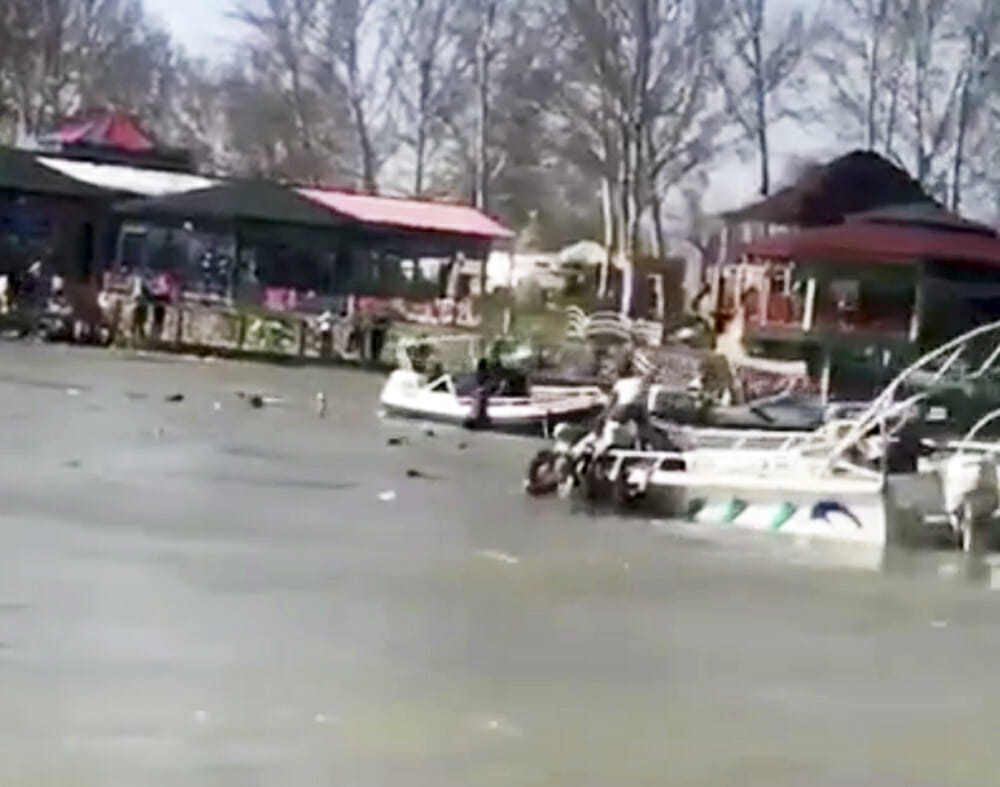
Protesters block Iraq president's pathway over ferry sinking
MOSUL, Iraq (AP) — Iraqi residents of the northern city of Mosul, angry over the sinking of a ferry in the Tigris River that killed 95 people, blocked a road where Iraq’s presidential convoy was passing on Friday, chanting “no to corruption” and pelting the provincial governor’s car with stones in protest.
The visit to Mosul by President Barham Saleh came as search teams were still trying to find more bodies after the ferry, overloaded with holidaymakers celebrating both Nowruz, the Persian New Year, and also Mother’s Day, capsized on Thursday near the city with dozens on board, including families with children.
The death toll on Friday rose to 95, after another body was found.
The protesters did not harm Saleh but shortly afterward, pelted the SUV of the governor of Nineveh province, Nofal al-Akoub, with bottles and stones, demanding that he be sacked from the post.
A video soon emerged, showing the two incidents. In one, Saleh is seen speaking from his car window with the protesters, many of whom were young men. Saleh had rushed to Mosul where he held meetings with security officials over the sinking of the ferry.
The other video shows protesters pelting the governor’s SUV and breaking the windshield before the vehicle speeds away.
The spiritual leader of Iraq’s Shia majority Grand Ayatollah Ali al-Sistani called for accountability for those responsible for the sinking and urged officials whose ministries were linked to the tragedy to resign. Al-Sistani’s message was delivered by his representative Ahmed al-Safi in the Shia holy city of Karbala.
Earlier Friday, relatives of the victims went to the local hospitals to collect bodies of their loved ones ahead of funerals. Some people gathered outside the hospital chanted: “No to corruption!” and “They are all thieves.”
“How can a ferry sail with no means of rescue available,” asked Dalia Mahmoud, a woman who was standing outside the coroner’s office.
Iraqi Prime Minister Adel Abdul-Mahdi ordered an investigation and also briefly visited Mosul, where he declared three days of national mourning.
Iraqi judicial authorities ordered the arrest of nine workers operating the ferry. The men were detained and an arrest warrant is out for the owner of the tourist island where it was headed.
Pope Francis sent a telegram of condolences to Iraqi authorities, expressing his “prayerful solidarity” with all those who lost loved ones. He wrote that he was praying for the whole Iraqi nation “the divine blessings of healing, strength and consolation.”
The sinking of the ferry was a tragic blow to Mosul, Iraq’s second-largest city that is still struggling to overcome the devastation wreaked by the Islamic State group. IS had captured Mosul it in the summer of 2014, making the city its main stronghold in Iraq. After U.S.-backed Iraqi forces retook Mosul three years later, in July 2017, much of the city was left in ruins.
“We lost a lot because of Daesh and we will not accept to lose more,” said Mahmoud, using an Arabic name to refer to the Islamic State group.
___
Abdul-Zahra reported from Baghdad. Associated Press writer Nicole Winfield in Rome contributed to this report.
The Western Journal has not reviewed this Associated Press story prior to publication. Therefore, it may contain editorial bias or may in some other way not meet our normal editorial standards. It is provided to our readers as a service from The Western Journal.
Truth and Accuracy
We are committed to truth and accuracy in all of our journalism. Read our editorial standards.
Advertise with The Western Journal and reach millions of highly engaged readers, while supporting our work. Advertise Today.












